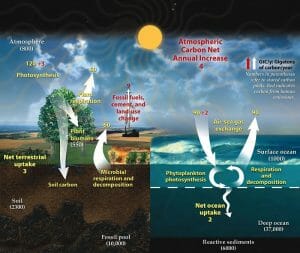The largest amount of actively recycled carbon on Earth is located in its oceans. The surface layer of the oceans contains dissolved inorganic carbon that is rapidly and continually exchanged with the atmosphere in large amounts. The oceans take in carbon from carbon dioxide in the atmosphere by dissolving it and converting it to carbonate. Carbon also enters the oceans from rivers in the form of dissolved organic carbon that comes from the weathering of rocks.
Through the process of photosynthesis, green plants incorporate carbon into sugar molecules which are passed along through the food chain to animals in the sea, air and on land. Carbon is also deposited on the ocean floor through the settling and decomposition of dead organisms as well as the shells of some creatures which contain calcium carbonate. Carbon exists and circulates in the deep waters of the oceans as well, sometimes for many years, where it either settles into the sediment on the bottom or recirculates back to the surface via the process of thermohaline circulation.
The oceans are also an important storage (sequestering) location for carbon. Human activities such as the burning of fossil fuels introduce more carbon into the atmosphere which is taken up by the oceans and, in turn, makes the water more acidic. The disruption of this delicate balance in the carbon cycle will in time, reduce the amount of carbon the oceans are capable of sequestering.

The image above shows the carbon cycle on Earth. The numbers represent billions of tons of carbon. Numbers in red are carbon that comes from human activity, numbers in white are stored carbon and yellow number represent natural fluxes. Volcanic and tectonic activity also contribute to the carbon cycle, but are not shown.
References
- Carbon Cycle. (n.d.). In Wikipedia. Retrieved from https://en.wikipedia.org/wiki/Carbon_cycle#Oceans
